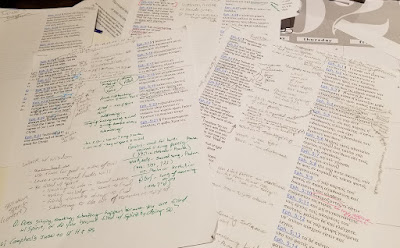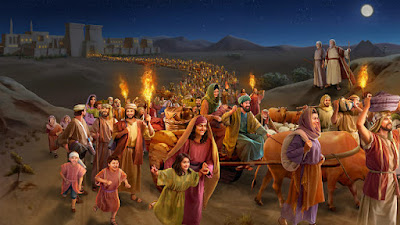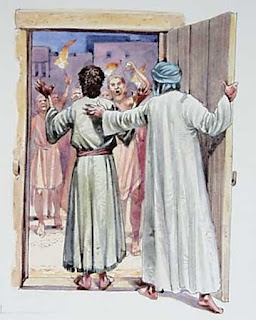Our God is an all-powerful, holy, holy, holy
God. It is not unusual for someone who encounters God in his holy splendor to
prostrate himself flat on his or her face in fearful reverence. The call of
Isaiah in Isaiah 6 is a classic example of this. The covenant people of God at
the base of mount Sinai had a similar reaction. The holy presence of God
covered the top of Mount Sinai with smoke, thunder and lightning along with his
great voice. They were so fearful that they wanted to hear the voice of the Lord
no more, and asked Moses to be their mediator so they would not have to hear
God's voice directly.
Knowing this about our God, many believers
would not want to question or challenge God. Few would even dream of implying
God might do something too extreme or unwarranted. Yet that is just what Job
does in the book of Job. However, Job is not the only one in scripture who is
so bold and daring. Maybe it's understandable in Job's case. After all, from a
human standpoint he doesn't have much to lose. If God were to smite him, he
would die and that would be the end of his suffering. But that is not what Job
wants. He wants vindication, but that's another study.
Is it ever okay to challenge God's decisions
and actions? Leaving aside the whether there could ever be an appropriate time
to do this, there are some illuminating examples of prominent servants of God
who boldly challenged the Almighty.
The first example comes from Genesis 18:22-33.
God revealed to Abraham that he would destroy Sodom and Gomorrah because of
their wickedness. The Hebrew of the passage emphasizes the greatness of their
sin in verse 20. Their sin is great "to the extreme" or to put it in
contemporary terms, "to the max."
He refers to the great outcry from Sodom and Gomorrah, which suggest a
pattern of grave injustice and cruel wickedness. The story that follows about the treatment of
Lot’s guests shows the sheer depth of the depravity of the people there. Even
after being blinded, the text says that they were still groping to find Lot’s
door in order to rape his guests.
God had every right to destroy these cities,
and it is likely that anyone who knew anything about these cities would agree.
Then Abraham did the unthinkable. It wasn’t that Abraham tried to change God’s
mind. It wasn’t even that he tried to
bargain with God to spare the city for a handful of righteous people if they
are found in the city. Rather, it was his
bold question which could implicate God - "Far be it from you to do
such a thing, to slay the righteous with the wicked, so that the righteous and
the wicked are treated alike. Far be it from you! Shall not the judge of all
the earth deal justly?" (Gen 18:25). What was Abraham saying? Why would he ask such a thing? Did he really believe God might do a grave
injustice by slaying the innocent along with the wicked? Abraham knew he was
going out on a limb, so he pled with God not to get angry as he tried to save
the city for the sake of the righteous in it.
In the end, Abraham could not save the city, but as someone once put it,
"Abraham has saved God." In other words, if there was any doubt about
the justice of the destruction of Sodom and Gomorrah, the encounter between
Abraham and God and subsequent salvation of Lot and his family has removed all
doubt as to God's justice in destroying every man and woman in the city.
Another case in Moses. When God made a covenant with the newly
formed nation of Israel at Mount Sinai in Exodus 19. Israel responded with,
"All that the Lord has spoken we will do" (Ex 19:8). But just over a month later, they built an
idol and had a feast to the Lord. In response, "9 The Lord said to Moses, “I have seen this people, and behold, they are an
obstinate people. 10 Now then let Me alone, that My
anger may burn against them and that I may destroy them; and I will make
of you a great nation.” (Ex 32:9-10). There is no
doubt that the people are guilty. God redeemed them out of Egyptian bondage to
be his own people, and they have already rebelled. There is no doubt that God
would be justified when he carries out his intent to destroy these people.
What is curious is God’s words to Moses, “Let
me alone so that…” What is that
supposed to mean? Can Moses really stop
God from unleashing his wrath? In saying
this, God practically invited Moses to intervene. Just as God revealed to Abraham
what he was going to do to Sodom and Gomorrah, thereby allowing Abraham to
respond, God appears to do the same with Moses.
Moses responded to try and save Israel.
However, unlike Abraham, Moses cannot appeal to God’s justice to try and
save them. There was no doubt that they
had sinned and dishonored God even though they could look up and see the
presence of God that had enveloped the top of Mount Sinai. God would have been justified in destroying
Israel and starting over again with Moses and make of him a great nation. This would also been in keeping with the
promise God made to Abraham, since Moses was of the seed of Abraham. Instead, Moses responded with, “O Lord, why does Your anger burn against Your people whom You have brought out
from the land of Egypt with great power and with a mighty hand? 12 Why should the
Egyptians speak, saying, ‘With evil intent He brought them out to
kill them in the mountains and to destroy them from the face of the earth’?
Turn from Your burning anger and change Your mind about doing harm to
Your people. 13 Remember Abraham,
Isaac, and Israel, Your servants to whom You swore by Yourself, and said
to them, ‘I will multiply your descendants as the stars of the
heavens, and all this land of which I have spoken I will give to your descendants,
and they shall inherit it forever.” (Ex 32:11-13)
God had called them "this" people
when he wanted to destroy them, but Moses continues to call them "your"
people. Moses appeals to what the
Egyptians might say if God destroyed them in the wilderness, and the promise God
made to Abraham to multiply his descendants and reminded God that this is “your”
people. Moses simply asks God to relent
and change his mind, and the text goes on to say, “So the Lord changed His mind about the harm which He
said He would do to His people” (Ex 32:14).
Unlike Abraham,
Moses was able to get God to relent, which was because of the covenant that God
had made with theses people.
Another example comes from Amos 7:1-7.
7 Thus the
Lord God showed
me, and behold, He was forming a locust-swarm when the spring crop
began to sprout. And behold, the spring crop was after the king’s
mowing. 2 And it came about, when it
had finished eating the vegetation of the land, that I said, “Lord God, please
pardon!
How can Jacob stand, For he
is small?” 3 The Lord changed His mind about this. “It
shall not be,” said the Lord. 4 Thus
the Lord God showed me, and behold, the Lord God was calling to contend with them by fire, and
it consumed the great deep and began to consume the farm land. 5 Then
I said, “Lord God, please stop!
How can Jacob stand, for he is small?” 6 The Lord changed
His mind about this. “This too shall not be,”
said the Lord God.”
Twice, God announces judgement on Israel in two
visions. Twice, Amos pleads with God, and twice God changed his mind.
The picture Amos paints of the nation and her
sins in the previous six chapters of Amos makes it clear that God is justified
in unleashing his wrath against Israel. God had caused the nation to become
prosperous. However, many were getting rich at the expense of the poor, so God
decides to withdraw his blessing and unleash his judgement. These include judges taking bribes and
perverting justice, exploitation of the poor and needy, idolatry, incest, violence
against the helpless, etc. There was do
doubt that Israel deserved the justice God planned to bring. However, when God showed Amos what he would
going to do, Amos managed to swerve the nature of God’s judgment.
There are other examples of men challenging God
and/or changing God’s mind However, there is something unique about the
examples above. What is amazing is that God intentionally involves men in his
decisions. Moses could have consented
and said, "I'm just your slave, I can't stop you. Besides, you're the
boss, do what you see is best". Instead, Moses boldly tells God it would
be better if God were to spare Israel so that Egypt would not think that God
brought Israel out to the wilderness with the evil intention of destroying them.
So Moses boldly gives God what he perceives to be a better option, and God
takes it! The same could be said of Abraham and Amos.
This demonstrates something about God’s character. God’s righteous anger is aroused by wickedness
and rebellion. However, his compassions
are also kindled by the pleads for mercy.
Here is what God said about himself to Moses when he revealed himself to
him in the cleft of the rock:
“6 Then the Lord passed by in front of him and proclaimed, “The Lord, the Lord God, compassionate and
gracious, slow to anger, and abounding in lovingkindness and truth; 7 who keeps
lovingkindness for thousands, who forgives iniquity, transgression and sin; yet
He will by no means leave the guilty unpunished, visiting
the iniquity of fathers on the children and on the grandchildren to the third
and fourth generations.” (Ex 34:6-7)
This passage from the New American Standard translates the Hebrew word, “hesed”
as lovingkindness. The word, which has
no English equivalent, is sometimes rendered, steadfast love, unfailing love,
loyalty, or even kindness/mercy. An
acceptable translation would be, “covenant love.” This word refers to love by covenant. In other words, love that is a choice. I can’t
help but notice the contrast of God visiting the iniquities of the fathers to
the third and fourth generations, but covenant love to thousands.
This self revelation of God and his character became the basis of Moses
pleading to God for Israel once again.
After rebelling and making a short-lived plan to elect a new leader and return
to Egypt, “11 The Lord said
to Moses, “How long will this people spurn Me? And how long will they not
believe in Me, despite all the signs which I have performed in their midst? 12 I
will smite them with pestilence and dispossess them, and I will make
you into a nation greater and mightier than they” (Num 14:11-12).
Once again, God wanted to stary over again with Moses, Israel had a pattern of grumbling and rebellion
against God.
“13 But Moses said to the Lord, “Then the Egyptians will hear of
it, for by Your strength You brought up this people from their midst, 14 and
they will tell it to the inhabitants of this land. They have heard
that You, O Lord, are in the
midst of this people, for You, O Lord,
are seen eye to eye, while Your cloud stands over them; and You go before them
in a pillar of cloud by day and in a pillar of fire by night. 15 Now
if You slay this people as one man, then the nations who have heard of
Your fame will say, 16 ‘Because
the Lord could not bring
this people into the land which He promised them by oath, therefore He
slaughtered them in the wilderness.’ 17 But now, I
pray, let the power of the Lord be great, just as You have declared, 18 ‘The Lord is slow to anger and abundant
in lovingkindness, forgiving iniquity and transgression; but He will by no
means clear the guilty, visiting the iniquity of the fathers on the
children to the third and the fourth generations.’ 19 Pardon,
I pray, the iniquity of this people according to the greatness of Your
lovingkindness, just as You also have forgiven this people, from Egypt even
until now” (Numb 14:13-19).
Moses once again pled with God to forgive
Israel. This time, he repeats God’s own words
about the kind of God he is: “slow to anger and abundant in covenant love.” Based on this, he prayed that God pardon them
“according to the greatness of your covenant love.”
“So the Lord said,
“I have pardoned them according to your word” (Num 14:20).
It occurs to me that all of this demonstrates
that God is eager to forgive. Indeed,
the Psalmist wrote,
5 For You, Lord, are good, and ready to
forgive,
And abundant in lovingkindness to all who call upon You”
(Ps 86:5).
God is ready to forgive. He is eager to forgive. He is so eager that he has at times invited the
righteous to pray for and plead of behalf of his people. Based on the greatness of his unfailing love
and the pleading of someone to advocate for his people, God changes his mind
and relents.
I know there may be those who might claim this is
heresy because it attacks the doctrine of God’s sovereignty and the immutability
of God. However, instead of starting
with doctrinal statements and looking for scripture to support them, one should
simply read the scriptures and allow them to speak for themselves as to the
kind of God we serve. God does not reveal
himself in theological propositions, logical deductions, and doctrinal
formulas. To reduce God to a proposition does him injustice. God reveals
himself through his actions, which are preserved for us in scripture. The
Biblical authors do not make the attempt to minimize God to the lowest common
denominator. The closest thing you have to this are the statements made about
God in various Psalms in the Psalter and Psalms sprinkled throughout the rest
of the Old Testament. However, these are not mere abstractions, but are often
connected with a story. Even the law given at Sinai is inseparable from the
history connected to it. To separate law from the story leads to legalism. God
is our Father who has come to live among us, not an abstract theological
deduction.
God is holy, but he is not so sensitive that
his people cannot question him. God is much bigger than we are. He can take it.
As uncomfortable as this may be at
times, it can be considered a great act of faith and is often the time of the
greatest spiritual growth.















